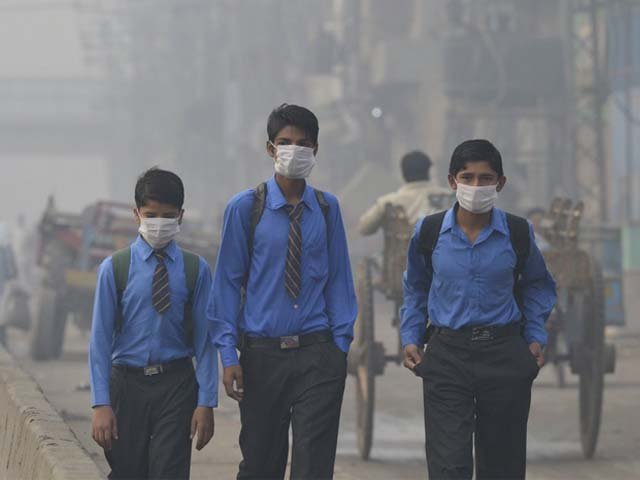
Will smog exacerbate the impact of Covid-19 in Pakistan?
Pakistan reported its first coronavirus infection on February 26, 2020, and, according to the data available at the time, it was feared that the mortality rate would be higher in provinces which have urban centres with high levels of air pollution. However, as the situation evolved, Khyber Pakhtunkhwa (K-P) reported the highest mortality rate, which was often attributed to a range of explanations, but one explanation that remained curiously absent was air pollution. This was due to the fact that in the summer season the concentration of air pollutants is comparatively low. On June 13th, Pakistan reported its highest number of Covid-19 cases, but by July the cases of local transmissions had plummeted in the country.
As a result, life returned to ‘normal’, and the high recovery rates across the country led people to believe that Pakistan had successfully tackled Covid-19. However, fast forward three months, Pakistan is now expecting the second wave of Covid-19 in the winter season. It is speculated now that the infections and mortality rates will be different to what Pakistan experienced during the first wave in the summer. Prime Minister Imran Khan, while addressing an award ceremony of Clean Green Pakistan Index in Islamabad, requested people “to exercise social distancing and self-discipline as a high level of pollution is contributing to the rising number of coronavirus cases”.
The problem
The concentration of PM2.5 in the air at 10 µg/m3 is rendered to be safe as per the World Health Organisation (WHO) Air Quality Guidelines. However, Pakistan has an annual average of PM2.5 of 65.81µg/m3, and was hence ranked as the second most polluted country in the IQAir AirVisual 2019 World Air Quality Report. The report also highlighted that the cities with high air pollution levels observe ten times more annual hours in the highest US AQI bracket (250.4 µg/m3) than in the US AQI bracket which meets the WHO annual target (<10 µg/m3). With the approaching winter, Pakistan is destined for another smog episode linked to the high pollutant concentrations due to waste crop burning, vehicular and industrial emissions, increased fuel burning for space heating, and smoke from brick kilns and a confluence of natural temperature inversion.
The impact
The impact of air pollution on the immune system has been widely researched, and it has been proven that it not only impacts immunity of the body but it is also associated with the exacerbation of pulmonary diseases. Moreover, the presence of high PM and nitrogen dioxide in the air is also linked to an increase in the spread of the virus since they can act as vectors which increase the number of receptors by 100 folds in the lungs to which the virus binds. Therefore, citizens who have lived in cities with poor air quality often have weakened immune defences and damaged lungs; hence rendering them more susceptible to the impacts of Covid-19. The study also proves that chronic lung exposure to nitrogen dioxide acts as a potent oxidant depleting anti-oxidant stores, leading to impaired tissue defences which may also favour pulmonary damage in Covid-19 patients. This can further give rise to the number of individuals contracting the virus and inundate the already struggling healthcare system.
The solution
At an individual level, it is needed now more than ever for every citizen to take Covid-19 seriously and to follow the SOPs. As things currently stand, prevention remains the key. At the governmental level, certain initiatives have been recorded in the past two years to curb the high pollutant levels in the country, especially after the winter smog episode of 2019. The government terminated the functioning of factories in 12 highly polluted districts for two months in the winter to reduce smog levels, and influenced brick kiln owners to transition to cleaner technologies. The government also announced the Electric Vehicle Policy in December 2019 to combat the emissions from the transport sector causing air pollution and greenhouse gas emissions, and in August 2020 the import of Euro-V standard fuel started in Pakistan. With these initiatives there is a need for the implementation of a clean air programme at the federal level, with an aim to improve the technical capacity of the country to record credible air pollution data to pin-point the sources of air pollution and take action against them. The Ministry of Climate Change has been involved in the revision of the Pakistan Clean Air Programme 2020 that emphasises the enhanced roles of the provinces on environment-related issues following the 18th Amendment to the Constitution. The pandemic has further highlighted how vital it is for Pakistan to implement the clean air programme.
While all these initiatives are positive steps in the right direction, their successes will be dictated by a strict implementation and adherence by the population. It becomes imperative for the citizens to play their role in ensuring that the potential exacerbation of the Covid-19 crisis due to the seasonal smog is countered by curbing activities that could facilitate the smog, while also ensuring a safety first approach by following the SOPs.

COMMENTS
Comments are moderated and generally will be posted if they are on-topic and not abusive.
For more information, please see our Comments FAQ